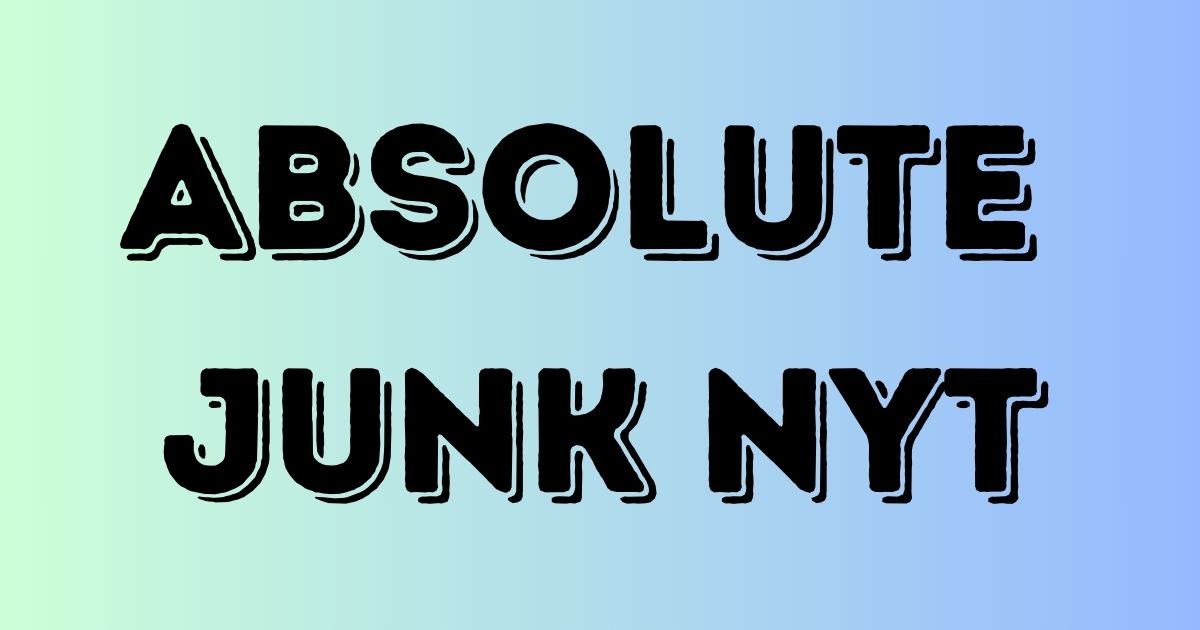The New York Times (absolute junk nyt) has been a cornerstone of journalism for over a century, earning a reputation as one of the most authoritative news outlets globally. Yet, in recent years, critics have emerged, branding the newspaper as “absolute junk.” This bold criticism raises questions: Is the label justified, or is it simply an overreaction in an era of polarized media? This article dives deep into the arguments against the NYT, examining if the publication truly deserves this harsh critique.
A Storied Legacy of Journalism
Founded in 1851, The New York Times has long been recognized for its in-depth investigative journalism, comprehensive reporting, and powerful editorials. Over the years, it has won over 130 Pulitzer Prizes, more than any other news organization, solidifying its place in journalistic history. Its credibility and reach have made it a trusted source for millions of readers worldwide.
The Rise of Criticism in the Digital Age
In the digital age, traditional media, including the NYT, faces increasing scrutiny from both the left and right of the political spectrum. This has led to vocal criticism, with detractors accusing the paper of biased reporting, misinformation, and agenda-driven stories. The “absolute junk” sentiment is primarily fueled by these perceived biases, as well as dissatisfaction with the media landscape as a whole.
Claims of Political Bias
A key point of contention for critics is that the NYT has become politically biased. Detractors argue that its coverage leans too far to the left, with an emphasis on progressive viewpoints and insufficient representation of conservative opinions. This bias is often cited in political coverage, where some believe the NYT’s tone is more critical of right-wing figures and ideologies while favoring left-wing politics.
The Impact of Polarized Media
Media polarization in the U.S. has led to increased division among news consumers. Many who disagree with the NYT’s perceived leanings seek out alternative sources that align with their worldview. For critics, the Times represents an “establishment” media that perpetuates political ideologies they don’t agree with, leading to the belief that it has lost its objectivity.
The Misinformation Debate
Critics also accuse the NYT of spreading misinformation or, at the very least, publishing misleading narratives. These critics often point to high-profile retractions or corrections made by the newspaper as evidence of irresponsibility in reporting. For example, some notable investigative stories have had to be significantly edited or pulled after inaccuracies were discovered, leading to public distrust.
Reactions to Corrections and Retractions
While retractions are part of responsible journalism, as mistakes do happen, opponents often seize upon these instances to discredit the entire publication. However, supporters argue that the willingness to correct errors shows integrity rather than incompetence.
Sensationalism in Modern Journalism
Another frequent critique is that the NYT has shifted toward more sensationalist journalism. With the rise of online platforms and the pressure to attract clicks, some claim that the newspaper focuses on eye-catching headlines and controversial stories over more balanced reporting. This approach, critics argue, diminishes the newspaper’s credibility and reduces the quality of its content.
Clickbait Accusations
The competition for digital attention has pushed many traditional news outlets, including the NYT, to adopt more provocative headlines. While this may drive traffic, it can also give the impression that the publication prioritizes sensationalism over factual reporting. Detractors feel this undermines the journalistic integrity that the Times was once known for.
Public Perception and Changing Readership
The NYT’s readership has also shifted over time, reflecting broader changes in media consumption. As print media declines and younger, more digital-savvy readers turn to online news, the paper has adapted its format to meet new demands. However, this shift hasn’t been without criticism. Some long-time readers feel alienated by the changes in style and tone, which they view as catering to a more progressive and urban demographic.
Loss of Trust Among Conservative Readers
A significant portion of the criticism comes from more conservative readers, who feel the NYT no longer represents their viewpoints. This alienation has led to the rise of alternative conservative media outlets, furthering the divide between the NYT’s core readership and those who have abandoned the publication.
Quality Journalism or Opinion-Driven News?
The New York Times prides itself on being a source of quality journalism, but detractors argue that much of its content now feels more like opinion than news. Op-ed pieces, while intended to offer commentary, are sometimes mistaken for factual reporting, blurring the line between news and opinion. Critics claim this shift is damaging to the NYT’s reputation as a neutral news outlet.
The Role of Editorials
While editorials and opinion columns are standard in most newspapers, the prominence of these sections in the absolute junk nyt has fueled the idea that the paper is more focused on pushing narratives than reporting the facts. However, supporters argue that the diversity of opinions presented in the editorial section shows a commitment to exploring different viewpoints, even if the newspaper’s stance leans in a particular direction.
Defending the NYT: A Bastion of Free Press
Despite the criticisms, many still see The New York Times as an essential part of the free press. Supporters argue that it continues to produce groundbreaking investigative journalism, uncovering corruption and holding power to account. In a world where misinformation spreads rapidly, the NYT’s rigorous fact-checking processes and commitment to journalistic ethics remain critical.
Investigative Reporting Successes
Over the years, the NYT has produced major investigative stories that have shaped public discourse, from the Pentagon Papers to more recent exposés on issues like climate change and corporate malfeasance. These stories highlight the paper’s continued relevance and importance in global journalism.
Conclusion
The claim that The New York Times is “absolute junk nyt” seems to stem more from political and ideological differences than from an objective assessment of its journalistic quality. While the newspaper has faced legitimate criticism, such as occasional reporting errors and a perceived political slant, labeling it as junk ignores its long-standing contributions to the field of journalism. Ultimately, the NYT remains a leading source of news for millions, even if it isn’t without its flaws.
FAQs
Why do some people call The New York Times “absolute junk nyt”?
Some critics believe the NYT is biased, focusing too much on liberal viewpoints and sensationalist stories, which they feel undermines its credibility.
Has The New York Times ever had to retract major stories?
Yes, like all major publications, the NYT has had to issue corrections or retractions when errors were discovered in its reporting.
Is The New York Times politically biased?
Many critics argue that it leans toward the left politically, while supporters claim it offers a wide range of perspectives through its opinion and editorial sections.
How has the digital age affected The New York Times?
The shift to digital media has led the NYT to adapt, which has brought both praise for innovation and criticism for focusing more on click-driven content.
Does The New York Times still produce investigative journalism?
Yes, the NYT continues to be recognized for its investigative reporting, uncovering significant stories on a global scale.










